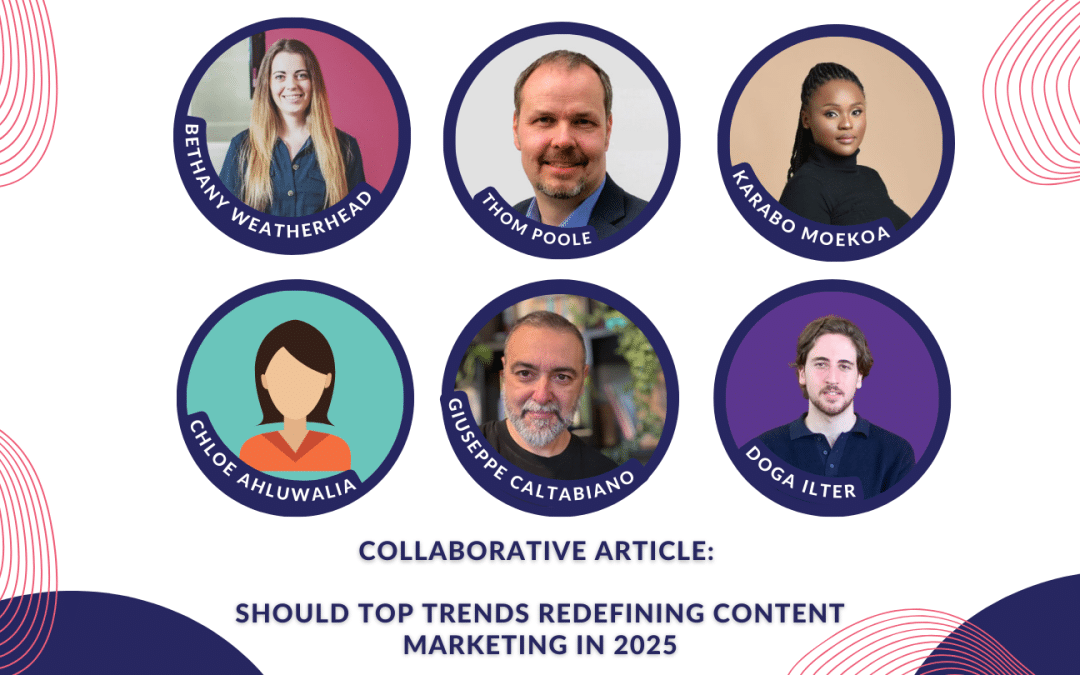Content marketing has come a long way, evolving from basic blog posts and SEO tricks to sophisticated, multi-channel strategies designed to engage different audiences. As we step into 2025, advancements in technology and shifting consumer expectations are pushing the boundaries even further.
Now more than ever, content marketing is about more than just getting noticed, it’s about forging real connections, standing out, and keeping up with the constant changes across platforms and algorithms. From using AI to fuel creativity and personalisation to focusing on honest storytelling and ethical practices, staying ahead means embracing these developments.
To explore what’s driving content marketing in 2025, we’ve turned to experts, Bethany Weatherhead, Karabo Moekoa, Chloe Ahluwalia, and Thom Poole. Their wealth of experience, from working with global brands to honing creative and email marketing skills, offers valuable insights into what lies ahead.
Whether you’ve been in the industry for years or are just getting started, their advice provides practical strategies to help you adapt and thrive. Ready to reimagine your approach? Let’s dive into these key trends.
Bethany Weatherhead
Director at Ruddy Duck Digital LTD
In 2025, popular AI tools like ChatGPT needn’t be the enemy when creating unique, well-written content that delivers results. ChatGPT and other tools can support research and planning that could otherwise take 10 times longer to do. Support features include the ability to create detailed personas to help you create content ideas and write content intended for the right audiences. AI can also help with writer’s block – suggesting content sections and prompts rather than using it to create and write your entire content strategy.
Being able to leverage these features without relying on them to create content for you will help you stand out in front of competitors who are either avoiding AI tools altogether or using them to automatically generate unimaginative content strategies. As a content strategist or digital marketer, your unique skillsets and creativity is more than valuable in 2025.
Additionally, it’s now more important than ever to not think of a content piece as solely a blog post or landing page. In the planning stage, consider how this content can be used across different platforms such as social media or video, to expand your reach across different mediums and different platforms where your audiences are likely to be. This can help to improve your organic reach at a time when Google’s results are being dominated by AI-generated features.
Karabo Moekoa
Digital marketing & product assistant, Expert Circle
One of the biggest shifts in content marketing is the increasing demand for authentic, human-focused content. Audiences want real stories, expert insights, and content that feels personal. Brands that focus on genuine connections will stand out.
Another key trend is email marketing. With social media becoming unpredictable due to algorithm changes, businesses are turning back to email. But it’s not just about sending newsletters, it’s about segmentation, personalisation, and automation to keep audiences engaged.
Lastly, SEO is evolving beyond keywords. Google is prioritising content that truly answers user questions. Marketers need to focus on high-quality, helpful content instead of just chasing rankings.
Chloe Ahluwalia
Marketing Manager
I find that it is important to have at least one creative skill set as a marketer, whether it be photography, design skills, videography, or something else.
Visual communication has become king recently in my opinion, audiences are more responsive to an image/video/logo they can absorb instantly as opposed to a piece of writing.
In my eyes, I see creative skills as a language, it communicates with audiences via their senses.
Thom Poole
International Marketing Consultant – Jack Marketing Solutions
With 35 years in marketing and 33 in digital, working with brands like Black & Decker, O2, eBay, and Google, I’ve seen the industry evolve. Here are the key trends shaping 2025:
1.AI-Driven Creativity
AI is no longer just a tool but a collaborator, helping marketers scale personalised, creative content while freeing time for strategy.
2.Hyper-Personalisation
Content tailored to behaviours and real-time moments is no longer optional, it’s the standard for meaningful engagement.
3.Integrated Content Ecosystems
Brands are moving from standalone posts to interconnected strategies, linking formats like AR, podcasts, and webinars for seamless audience experiences.
4.Community-First Content
Consumers trust other consumers. User-generated content and collaborative storytelling now define authentic brand communication.
5.Sustainable Storytelling
Ethics and transparency drive content strategies as audiences demand action over empty promises.
6.AI-Led Search Evolution
Traditional SEO is giving way to AI-powered search, where intent, context, and multimedia reign supreme.Content marketing in 2025 demands agility, creativity, and a focus on genuine connections. Those who adapt will thrive.
Giuseppe Caltabiano
Senior Marketing Director, AVK
I have to admit: I’ve never been particularly great at predictions and trends. In 2023, for example, I was far from imagining that AI would change content marketing so aggressively. Yet, that was the year GenAI didn’t just enter the industry—it devoured it. We all know the story: the past two years have been a powerful reminder that in the fast-moving world of marketing and content, disruption rarely follows a script.
That’s why I hesitate to call these “trends.” What we’re witnessing are forces reshaping the B2B marketing landscape.
1. Branding vs. Activation: The Debate is (Finally) Settled
If there’s one thing content marketers should have digested by now, it’s the duality of branding and activation. For years, we’ve seen B2B marketing lean too heavily on performance-driven, bottom-funnel tactics, chasing short-term wins at the expense of long-term brand equity. The message is finally landing: brand-building drives demand and activation captures it. Content marketers have finaly understood.
2. The Rise of the B2B Creator Economy
The creator economy isn’t new, but its centre of gravity has shifted. It was once dominated by consumer influencers and lifestyle brands, but now it’s making a serious impact in B2B. The shift started one year ago and now represents a fundamental change in how trust is built.
People want to learn from, be inspired by, and connect with individual voices who sapiently use their expertise with storytelling. People follow people, not brands. They engage with content from professionals they trust—not corporates.
3. The Decline of SEO
The latest headlines about HubSpot’s traffic collapse are just one symptom of a broader shift. AI-generated search results, Google’s overview, and shifting user behaviours mean that relying on search alone is a dangerous game.
4. The Hybrid AI + Human Content Model
If you run content at a B2B company, you’re using AI. But the winning approach isn’t about replacing human writers; it’s about knowing what AI is good for and where human expertise is irreplaceable. Think of it this way: AI is like a fast food—useful for quick, low-effort content. But Michelin-star content? That still needs human chefs. AI can generate summaries and data-driven insights, but the most valuable content—the kind that builds authority and earns trust—will still (always) come from human creativity and deep expertise.
5. The DEI Backlash and Brand Reputation
Kantar recently predicted that diversity and inclusion would become critical drivers of brand perception and loyalty, especially among younger generations. But things are getting a bit more complicated. With Musk, Trump, and Zuckerberg’s crusades against DEI, companies are caught in the crossfire. Some brands will double down on their commitments, while others may retreat under pressure. Either way, staying silent isn’t a neutral position anymore: brands will have to navigate this debate carefully. My company, for instance, won’t retreat.
6. The Shift to Total Video Strategy
Video consumption habits are more fragmented than ever. Audiences are spread across multiple channels. That means marketers need a “total video” approach—balancing investments across formats and platforms. From long-form educational content to short-form social clips, video is becoming the backbone of modern content marketing.
7. The Multichannel Imperative
Marketing effectiveness research, such as Dr. Grace Kite’s studies, consistently confirms that the best-performing campaigns are synergistic. It’s not about throwing content across multiple channels randomly; it’s about ensuring each piece complements and reinforces the others. Or, as Kite puts it, “The whole is more than the sum of its fragmented parts.”
Again, these aren’t trends; they’re the forces defining the next chapter of B2B marketing. Some will accelerate, some others will evolve, and new ones will emerge.
Doga Ilter
Director & Marketing Consultant at RETLI GROUP
In 2025, content should craft compelling narratives and strategically amplify them to build brand associations. Every piece of content should contribute to building a aspirational brand story.
To achieve this, content must showcase the lifestyle your ideal customer desires or lives.
Building this association requires integrating your product with specific aesthetics, narratives, locations, and lifestyles.
Some brands are already excelling at this by seamlessly connecting their products to the lifestyle their audience desires.
Why does this approach matter? Because customers want to associate themselves with the brands they buy from.
Content isn’t just photos and videos; it’s a cultural touchpoint.
By implementing the strategies and insights shared by experts Bethany Weatherhead, Karabo Moekoa, Chloe Ahluwalia, Giuseppe Caltabiano, Doga Ilter and Thom Poole, you can position your brand for success in 2025’s evolving content marketing. From leveraging AI to streamline creativity, embracing hyper-personalisation, and prioritising authentic storytelling, to integrating content across multiple platforms, these trends offer practical ways to engage audiences and stay ahead.
Remember, the key lies in adapting these strategies to your unique brand voice and audience needs. Whether you’re enhancing your email marketing efforts, exploring AI tools, or building community-driven campaigns, the future of content marketing rewards those who are agile, creative, and human-focused.
Take these expert insights as inspiration to refine your approach and create impactful, forward-thinking content strategies. The tools are there, the next move is yours.




